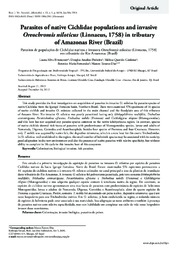Parasites of native Cichlidae populations and invasive Oreochromis niloticus (Linnaeus, 1758) in tributary of Amazonas River (Brazil).
Parasites of native Cichlidae populations and invasive Oreochromis niloticus (Linnaeus, 1758) in tributary of Amazonas River (Brazil).
Autoria: BITTENCOURT, L. S.; PINHEIRO, D. A.; CARDENAS, M. Q.; FERNANDES, B. M.; DIAS-TAVARES, M.
Resumo: This study provides the first investigation on acquisition of parasites in invasive O. niloticus by parasite species of native Cichlidae from the Igarapé Fortaleza basin, Northern Brazil. There were examined 576 specimens of 16 species of native cichlids and invasive O. niloticus collected in the main channel and the floodplain area of this tributary of Amazon River. The invasive O. niloticus was poorly parasitized having only Ichthyophthirius multifiliis, Trichodina centrostrigeata, Paratrichodina africana, Trichodina nobilis (Protozoa) and Cichlidogyrus tilapiae (Monogenoidea), and this host has not acquired any parasite species common to the native ichthyofauna region. In contrast, species of native cichlids showed rich fauna of parasites with predominance of Monogenoidea species, larvae and adults of Nematoda, Digenea, Cestoidea and Acanthocephala, besides four species of Protozoa and four Crustacea. However, only T. nobilis was acquired by native fish, the Aequidens tetramerus, which is a new host for this exotic Trichodinidae. In O. niloticus, well established in the region, the small number of helminth species may be associated with its rusticity, good adaptation in the new environment and also the presence of native parasites with relative specificity, but without ability to complete its life cycle in this invasive host of this ecosystem.
Ano de publicação: 2014
Tipo de publicação: Artigo de periódico
Unidade: Embrapa Amapa
Palavras-chave: Animal parasite, Biological invasion, Colonization, Colonização, Fish parasite, Invasão biológica, Parasito animal, Parasito de peixe
Observações
1 - Por padrão são exibidas publicações dos últimos 20 anos. Para encontrar publicações mais antigas, configure o filtro ano de publicação, colocando o ano a partir do qual você deseja encontrar publicações. O filtro está na coluna da esquerda na busca acima.
2 - Para ler algumas publicações da Embrapa (apenas as que estão em formato ePub), é necessário ter, no celular ou computador, um desses softwares gratuitos. Sistemas Android: Google Play Livros; IOS: iBooks; Windows e Linux: software Calibre.
Acesse outras publicações
Acesse a Base de Dados da Pesquisa Agropecuária (BDPA) para consultar o acervo completo das bibliotecas da Embrapa.

